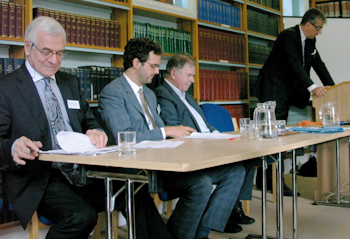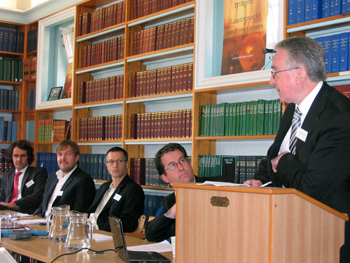 The Lauterpacht Centre for International Law and the Faculty of Law at the University of Cambridge hosted a major conference on Interpretation in International Law on 27 August 2013. The event was convened by Daniel Peat and Matthew Windsor, two PhD candidates at Gonville and Caius College, and was attended by over 100 delegates.
The Lauterpacht Centre for International Law and the Faculty of Law at the University of Cambridge hosted a major conference on Interpretation in International Law on 27 August 2013. The event was convened by Daniel Peat and Matthew Windsor, two PhD candidates at Gonville and Caius College, and was attended by over 100 delegates.
The conference was developed on the basis that the relevance of interpretation to the academic study and professional practice of international law is inescapable. Yet interpretation in international law has not traditionally been examined as a distinct field and foundational concept. Given that international law is constituted, in practical terms, by acts of interpretation, there is a need for greater methodological awareness of interpretive theory and practice in international law.
The keynote panel, chaired by Professor James Crawford (University of Cambridge), included presentations by: Professor Andrea Bianchi (The Graduate Institute, Geneva), who used the metaphor of the game to explain how interpretation works in international law; Sir David Baragwanath (President of the Special Tribunal for Lebanon), who considered the interpretive challenges of adjudication across the common law/civil law divide; and Dr Ingo Venzke (University of Amsterdam), who interrogated the implications of considering international law as a language for interpretive practice.
A second plenary panel, chaired by Sir Michael Wood (20 Essex Street/International Law Commission), comprised presentations by: Professor Duncan Hollis (Temple University), who considered the existential function of interpretation in international law; Professor Jean d’Aspremont (Manchester University), who distinguished content-determination and law-ascertainment in interpretive theory; Professor Rene Provost (McGill University), who discussed interpretation in international law as a transcultural project; and Jens Olesen (Oxford University), who elucidated the relationship between interpretation and politics.
The topics of other panels included: treaty interpretation; interpretation and legal theory; interpretation and adjudication; interpretation and the sources of international law; interpretation and the interpreters; and interpretation and rights.
Professor Philip Allott (University of Cambridge) closed the conference by canvassing the programmatic, prevenient and pragmatic dimensions of interpretation in international law.
 In their presentations and discussions, the many distinguished academics and practitioners in attendance met the following objectives of the conference. Rather than focusing exclusively on textual interpretation or doctrinal exposition, the identity of the interpreters and the epistemic communities involved in interpretation should be foregrounded. Rather than focusing exclusively on how to interpret, who has or claims to have the authority to interpret should be examined. Rather than approaching issues of interpretation with disciplinary insularity, the practice and process of interpretation should be approached in a cross cutting way.
In their presentations and discussions, the many distinguished academics and practitioners in attendance met the following objectives of the conference. Rather than focusing exclusively on textual interpretation or doctrinal exposition, the identity of the interpreters and the epistemic communities involved in interpretation should be foregrounded. Rather than focusing exclusively on how to interpret, who has or claims to have the authority to interpret should be examined. Rather than approaching issues of interpretation with disciplinary insularity, the practice and process of interpretation should be approached in a cross cutting way.
The Interpretation in International Law conference was kindly sponsored by Oxford University Press, Cambridge University Press, Hart Publishing, Ashgate, the University of Cambridge Faculty of Law, the Lauterpacht Centre for International Law and Gonville and Caius College.

 Facebook
Facebook  X/Twitter
X/Twitter  Instagram
Instagram  YouTube
YouTube  Flickr
Flickr  LinkedIn
LinkedIn